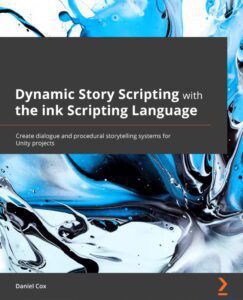Dan Cox is the author of Dynamic Story Scripting with the ink Scripting Language; we got the chance to sit down with him and find out more about his experience of writing with Packt.
Q: What are your specialist tech areas?
Dan: Narrative design; Unity; Unreal.
Q: How did you become an author for Packt? Tell us about your journey. What was your motivation for writing this book?
Dan: I was initially contacted based on my existing open-source materials on GitHub and previous video series on my YouTube channel on the narrative scripting language ink. After teaching it multiple times to college audiences, I felt there was a strong need for a book on the topic and took this opportunity to create one myself.
Q: What kind of research did you do, and how long did you spend researching before beginning the book?
Dan: I already had a book-length project covering most of the same topics I had written as a “cookbook,” collection of examples, based on resources I had created when previously teaching ink online. Research for the book itself was relatively simple from there. I looked through what I had, how it had worked when I had taught it, and re-organized the material I wanted to cover into a longer outline covering some new topics such as dialogue systems and procedural storytelling I knew would be exciting for some audiences.
Q: Did you face any challenges during the writing process? How did you overcome them?
Dan: The greatest challenge was more personal than professional. When I first agreed to write the book, my anticipated teaching schedule had me teaching remotely and primarily online. This shifted as the book began, and I had to balance the writing of the book against teaching different subjects at the same time. I don’t recommend teaching two new courses while also writing a book at the same time!
Q: What’s your take on the technologies discussed in the book? Where do you see these technologies heading in the future?
Dan: Narrative-based games were some of the first video games created and have remained a focus across both independent and AAA development. ink is a powerful language for creating narrative systems and has grown more popular as award-winning games have used it. It will continue to expand in the coming years as more projects incorporate ink in their own Unity projects.
Q: Why should readers choose this book over others already on the market? How would you differentiate your book from its competition?
Dan: There are no other current books on ink on the market! While there are other books covering different tools used for similar purposes, no book covers both ink and Unity in such a way to give audiences a “hands-on” experience with the tools.
Q. What are the key takeaways you want readers to come away from the book with ?
Dan: If you are looking for an easy-to-learn scripting language for narrative purposes, ink is a great choice. It provides markup for defining different sections of story content and how to move between them. With the ink-Unity Integration plugin, ink can be used with Unity to combine the strengths of both.
Q. What advice would you give to readers learning tech? Do you have any top tips?
Dan: You can’t learn without failing. Try new technologies and use resources like books to help you learn the latest and greatest.
Q. Do you have a blog that readers can follow?
Dan: videlais.com
Q. How would you describe your author journey with Packt? Would you recommend Packt to aspiring authors?
Dan: Much more challenging than anticipated. I would possibly recommend Packt to aspiring authors, depending on their other responsibilities and work load.
Q. Do you belong to any tech community
Dan: Interactive Fiction Technology Foundation
Q. What is that one writing tip that you found most crucial and would like to share with aspiring authors?
Dan: Outline everything!









